初中英语八种时态归纳复习
初中英语语法总结8种时态
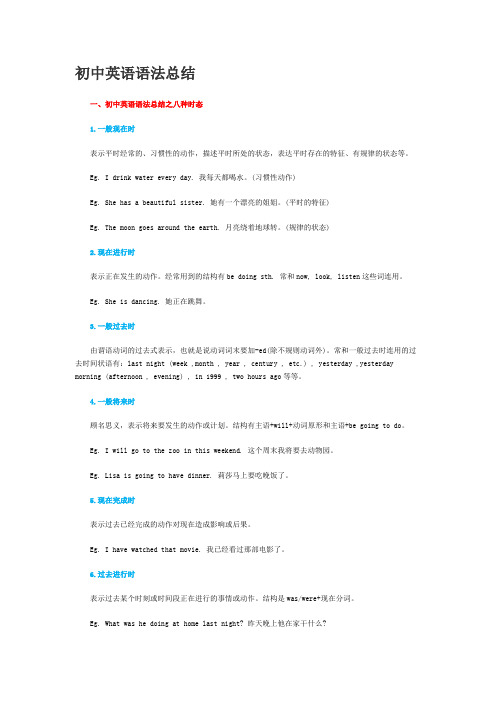
初中英语语法总结一、初中英语语法总结之八种时态1.一般现在时表示平时经常的、习惯性的动作,描述平时所处的状态,表达平时存在的特征、有规律的状态等。
Eg. I drink water every day. 我每天都喝水。
(习惯性动作)Eg. She has a beautiful sister. 她有一个漂亮的姐姐。
(平时的特征)Eg. The moon goes around the earth. 月亮绕着地球转。
(规律的状态)2.现在进行时表示正在发生的动作。
经常用到的结构有be doing sth. 常和now, look, listen这些词连用。
Eg. She is dancing. 她正在跳舞。
3.一般过去时由谓语动词的过去式表示,也就是说动词词末要加-ed(除不规则动词外)。
常和一般过去时连用的过去时间状语有:last night (week ,month , year , century , etc.) , yesterday ,yesterday morning (afternoon , evening) , in 1999 , two hours ago等等。
4.一般将来时顾名思义,表示将来要发生的动作或计划。
结构有主语+will+动词原形和主语+be going to do。
Eg. I will go to the zoo in this weekend. 这个周末我将要去动物园。
Eg. Lisa is going to have dinner. 莉莎马上要吃晚饭了。
5.现在完成时表示过去已经完成的动作对现在造成影响或后果。
Eg. I have watched that movie. 我已经看过那部电影了。
6.过去进行时表示过去某个时刻或时间段正在进行的事情或动作。
结构是was/were+现在分词。
Eg. What was he doing at home last night? 昨天晚上他在家干什么?7.过去将来时表示过去的某时以后将要发生的动作。
初中英语八种时态归纳总结
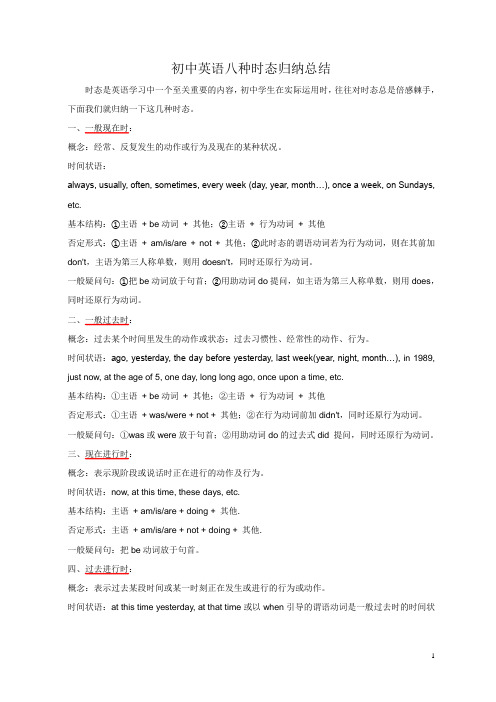
初中英语八种时态归纳总结时态是英语学习中一个至关重要的内容,初中学生在实际运用时,往往对时态总是倍感棘手,下面我们就归纳一下这几种时态。
一、一般现在时:概念:经常、反复发生的动作或行为及现在的某种状况。
时间状语:always, usually, often, sometimes, every week (day, year, month…), once a week, on Sundays, etc.基本结构:①主语+ be动词+ 其他;②主语+ 行为动词+ 其他否定形式:①主语+ am/is/are + not + 其他;②此时态的谓语动词若为行为动词,则在其前加don't,主语为第三人称单数,则用doesn't,同时还原行为动词。
一般疑问句:①把be动词放于句首;②用助动词do提问,如主语为第三人称单数,则用does,同时还原行为动词。
二、一般过去时:概念:过去某个时间里发生的动作或状态;过去习惯性、经常性的动作、行为。
时间状语:ago, yesterday, the day before yesterday, last week(year, night, month…), in 1989, just now, at the age of 5, one day, long long ago, once upon a time, etc.基本结构:①主语+ be动词+ 其他;②主语+ 行为动词+ 其他否定形式:①主语+ was/were + not + 其他;②在行为动词前加didn't,同时还原行为动词。
一般疑问句:①was或were放于句首;②用助动词do的过去式did 提问,同时还原行为动词。
三、现在进行时:概念:表示现阶段或说话时正在进行的动作及行为。
时间状语:now, at this time, these days, etc.基本结构:主语+ am/is/are + doing + 其他.否定形式:主语+ am/is/are + not + doing + 其他.一般疑问句:把be动词放于句首。
初中英语8种时态复习及专题练习

初中英语8种时态复习I.时态详解一、一般现在时:概念:①表现在存在的状态;②现在经常、反复发生的动作。
时间状语:always,usually,often,sometimes,everyweek(day,year,month…),onceaweek,onSund ays,etc.基本结构:①主语+be(am,is,are);②主语+行为动词原型(单三形式主语+动词单三形式)否定形式:①am/is/are+not;(is+not=isn’t;are+not=aren’t)②此时态的谓语动词若为行为动词,则在其前加don't,如主语为第三人称单数,则用doesn't,同时还原行为动词。
一般疑问句:①把be动词放于句首;②用助动词do提问,如主语为第三人称单数,则用does,同时,还原行为动词。
二、一般过去时:概念:①过去某个时间里发生的动作或状态;②过去习惯性、经常性的动作、行为。
时间状语:ago,yesterday,thedaybeforeyesterday,lastweek(year,night,month…),in1989,jus tnow,attheageof5,oneday,longlongago,onceuponatime,etc.基本结构:①主语+be(was,were);②主语+动词过去式否定形式:①was/were+not;(was+not=wasn’t;were+not=weren’t)②在行为动词前加didn't,同时还原行为动词。
一般疑问句:①was或were放于句首;②用助动词did提问,同时还原行为动词。
三、现在进行时:概念:表示现阶段或说话时正在进行的动作及行为。
时间状语:now,look,listen,atthistime,thesedays,etc.基本结构:be(am,is,are)+doing否定形式:be(am,is,are)+not+doing.一般疑问句:把be动词放于句首。
(完整版)初中英语八种时态总结归纳
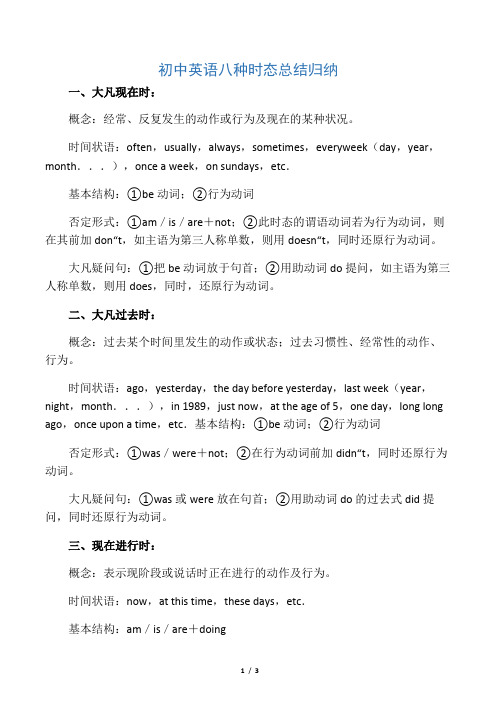
初中英语八种时态总结归纳一、大凡现在时:概念:经常、反复发生的动作或行为及现在的某种状况。
时间状语:often,usually,always,sometimes,everyweek(day,year,month...),once a week,on sundays,etc.基本结构:①be动词;②行为动词否定形式:①am/is/are+not;②此时态的谓语动词若为行为动词,则在其前加don“t,如主语为第三人称单数,则用doesn“t,同时还原行为动词。
大凡疑问句:①把be动词放于句首;②用助动词do提问,如主语为第三人称单数,则用does,同时,还原行为动词。
二、大凡过去时:概念:过去某个时间里发生的动作或状态;过去习惯性、经常性的动作、行为。
时间状语:ago,yesterday,the day before yesterday,last week(year,night,month...),in 1989,just now,at the age of 5,one day,long long ago,once upon a time,etc.基本结构:①be动词;②行为动词否定形式:①was/were+not;②在行为动词前加didn“t,同时还原行为动词。
大凡疑问句:①was或were放在句首;②用助动词do的过去式did提问,同时还原行为动词。
三、现在进行时:概念:表示现阶段或说话时正在进行的动作及行为。
时间状语:now,at this time,these days,etc.基本结构:am/is/are+doing否定形式:am/is/are+not+doing大凡疑问句:把be动词放在句首四、过去进行时:概念:表示过去某段时间或某一时刻正在发生或进行的行为或动作。
时间状语:at this time yesterday,at that time或以when引导的谓语动词是大凡过去时的时间状语等。
初中英语的八种时态
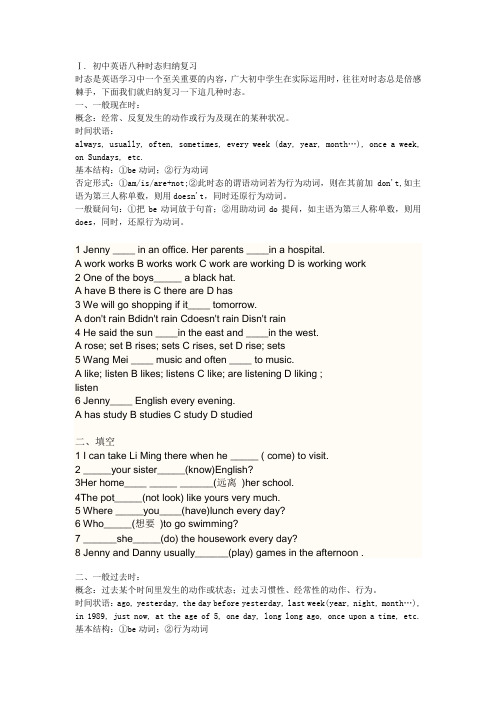
Ⅰ. 初中英语八种时态归纳复习时态是英语学习中一个至关重要的内容,广大初中学生在实际运用时,往往对时态总是倍感棘手,下面我们就归纳复习一下這几种时态。
一、一般现在时:概念:经常、反复发生的动作或行为及现在的某种状况。
时间状语:always, usually, often, sometimes, every week (day, year, month…), once a week, on Sundays, etc.基本结构:①be动词;②行为动词否定形式:①am/is/are+not;②此时态的谓语动词若为行为动词,则在其前加don't,如主语为第三人称单数,则用doesn't,同时还原行为动词。
一般疑问句:①把be动词放于句首;②用助动词do提问,如主语为第三人称单数,则用does,同时,还原行为动词。
1 Jenny ____ in an office. Her parents ____in a hospital.A work worksB works workC work are workingD is working work2 One of the boys_____ a black hat.A haveB there isC there areD has3 We will go shopping if it____ tomorrow.A don't rain Bdidn't rain Cdoesn't rain Disn't rain4 He said the sun ____in the east and ____in the west.A rose; setB rises; setsC rises, setD rise; sets5 Wang Mei ____ music and often ____ to music.A like; listenB likes; listensC like; are listeningD liking ;listen6 Jenny____ English every evening.A has studyB studiesC studyD studied二、填空1 I can take Li Ming there when he _____ ( come) to visit.2 _____your sister_____(know)English?3Her home____ _____ ______(远离)her school.4The pot_____(not look) like yours very much.5 Where _____you____(have)lunch every day?6 Who_____(想要)to go swimming?7 ______she_____(do) the housework every day?8 Jenny and Danny usually______(play) games in the afternoon .二、一般过去时:概念:过去某个时间里发生的动作或状态;过去习惯性、经常性的动作、行为。
【初中】英语八大时态详细汇总

现在完成时意义:He has lived here for many years.2.强调后果/影响I have read the book .结构:时间状语:(1)since 的用法Since+时间点I have lived here since 2022.一段时间+ago I have lived here since two years ago.+从句(用一般过去时)常见句型:It is + 一段时间+since从句主句(完成时)+since(一般过去时)It is seven years since I met him last time.He has learned 2000 words since he went to school.(2)For+时间段We have known each other for five years.(3)already(用于肯定句中)/yet (用与否定句或疑问句中)just/everrecently( in recent years)before never等(just now是一般过去时的时间状语)I have just finished my homework.Have you ever seen one like this?(4So far /in the past few years等,表示:“目前为止”非延续性动词延续性动词非延续性动词延续性动词Borrow Keep Fall asleep Be asleep buy have Catch a cold Have a cold leave Be away Begin/start Be ondie Be dead open Be open Come (to)Be in/at close Be closed区分Have gone to去了没回Have been to去了回来(常与次数once/twice/基数词+times连用)Have been in在某地呆了多久例句:(1)You can’t see her because he has gone to Sibo.(2)He has been to Sibo twice.(3)He has been in this city for two years.备注:Here/there/home 不与介词连用。
初中英语八种时态归纳PPT
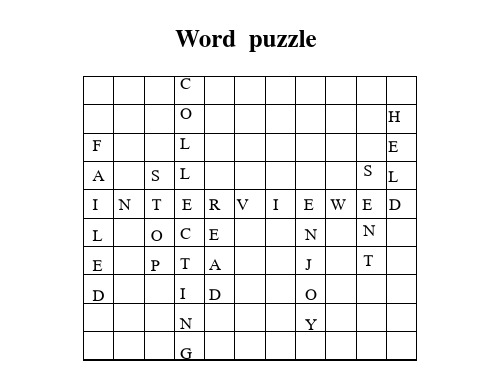
Part B 语态
Active Voice
Passive Voice
主动语态
1. Many people speak English.
At the party.
--- I _l_ik_e___ your jacket, Tim. How long _h_a_v_e_y_o_u__h_a_d__ it?
Oh…er… I __b_o_u_g_h_t__it last week. W__o_u_l_d_y_o_u__li_k_e_ to dance, Becky? ---Phew. It’s __h_o_t__ here. --- Put your jacket on the chair. You ____n_e_e_d_n’wt orry. It’ll be ok. ---That’s _b_e_tt_e_r __.
8. Mr. Green and his wife had lived (live) in London for a few years before they came (come) to work in China in 2001.
9. He said he w__o_u_ld__n_o_t_s_p_e_a(k not,speak) at the meeting the next day.
4. Hurry! Your classmates _a_r_e_w__a_it_i_n_g(wait) for you in the classroom..
1. This is the third time you _h_a_v_e__b_e_e_n__(be) here.
初中英语8个时态归纳总结
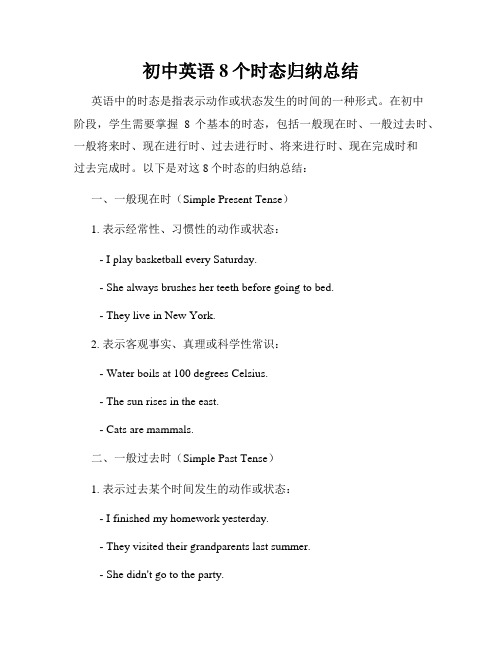
初中英语8个时态归纳总结英语中的时态是指表示动作或状态发生的时间的一种形式。
在初中阶段,学生需要掌握8个基本的时态,包括一般现在时、一般过去时、一般将来时、现在进行时、过去进行时、将来进行时、现在完成时和过去完成时。
以下是对这8个时态的归纳总结:一、一般现在时(Simple Present Tense)1. 表示经常性、习惯性的动作或状态:- I play basketball every Saturday.- She always brushes her teeth before going to bed.- They live in New York.2. 表示客观事实、真理或科学性常识:- Water boils at 100 degrees Celsius.- The sun rises in the east.- Cats are mammals.二、一般过去时(Simple Past Tense)1. 表示过去某个时间发生的动作或状态:- I finished my homework yesterday.- They visited their grandparents last summer.- She didn't go to the party.2. 表示过去的经历或习惯:- When I was young, I often went swimming. - He always ate breakfast at 8 o'clock.三、一般将来时(Simple Future Tense)1. 表示将来要发生的动作或事件:- I will go shopping tomorrow.- They are going to have a picnic next week. - She won't be late for the meeting.2. 表示将来的打算或意愿:- I am going to be a doctor when I grow up.- We will help you with your project.四、现在进行时(Present Continuous Tense)1. 表示现在正在进行的动作:- We are studying English at the moment.- He is playing soccer with his friends.- They aren't watching TV right now.2. 表示现阶段的趋势或变化:- The population is increasing rapidly.- More and more people are using smartphones.五、过去进行时(Past Continuous Tense)1. 表示过去某一时间段内正在进行的动作:- I was reading a book when the phone rang.- They were cooking dinner at 7 o'clock.2. 表示过去的同时发生的两个动作:- She was listening to music while doing her homework.六、将来进行时(Future Continuous Tense)1. 表示将来某一时间段内正在进行的动作:- Tomorrow, they will be flying to Paris.- I will be waiting for you at the station.2. 表示将来的预测或计划:- This time next month, I will be studying for my exams.七、现在完成时(Present Perfect Tense)1. 表示过去某一时间发生的动作对现在造成的影响或结果: - I have finished my homework, so I can watch TV now.- She has already eaten lunch.2. 表示过去某一时间内多次发生的动作:- We have visited that museum several times.八、过去完成时(Past Perfect Tense)1. 表示过去某一时间点之前已经完成的动作:- By the time they arrived, we had already left.- I had finished my work before the deadline.2. 表示过去的顺序或先后关系:- She realized that she had forgotten her keys after she locked the door.以上是初中英语的8个时态的归纳总结。
- 1、下载文档前请自行甄别文档内容的完整性,平台不提供额外的编辑、内容补充、找答案等附加服务。
- 2、"仅部分预览"的文档,不可在线预览部分如存在完整性等问题,可反馈申请退款(可完整预览的文档不适用该条件!)。
- 3、如文档侵犯您的权益,请联系客服反馈,我们会尽快为您处理(人工客服工作时间:9:00-18:30)。
初中英语八种时态归纳复习时态是英语学习中一个至关重要的内容,广大初中学生在实际运用时,往往对时态问题倍感棘手,下面我们就归纳复习一下这几种时态。
一、一般现在时(一)定义表示经常性或习惯性的动作,或存在的状态,还表示主语具备的性格和能力及客观真理。
例:I get up at 6:30 in the morning .She is at home .(二)构成主要用动词原形表示,当主语是第三人称单数时,在动词词尾加s/es。
(三)句型1、肯定句:主语+谓语+其他。
She reads English everyday .2、否定句:主语+don’t/doesn’t+谓语+其他。
He doesn’t get up at 6:30 in the morning .3、一般疑问句:Do/Does+主语+V原+其他?Do you like English ? Yes ,I do ./No, I don’t .4、特殊疑问句:特殊疑问词+do/does+主语+V原+其他?What time do you get up every morning ?Where does your father work ?(三)用法1、表示经常性或习惯性的动作,或存在的状态,带与表示频率的时间状语如:often , sometimes , usually,always , everyday year,month...), once/twice a week (month , year , etc.) , seldom ,on sundays等连用。
I leave home for school at seven every morning .2、表示客观真理,科学事实、格言警句。
The sun rises in the east .日出东方。
The earth goes around the sun .地球绕着太阳转。
Ten minus two is eight.十减二等于八。
Light travels faster than sound .光的速度比声音的速度快。
The United States lies by the west coast of the Pacific Ocean. 美国位于太平洋西岸。
3、根据英文语法规定,当主句的谓语动词是一般将来时,那么时间或条件状语从句的谓语动词只能用一般现在时来表示将来要发生的动作。
I'll tell him the news when he comes back. 他回来时,我将告诉他这个消息。
If you come this afternoon,we’ll have a meeting .4、仅为了描述状态、性质、特征、能力等等。
这里的目的是为了"描述现阶段的动作或状态",其重点"不是强调动作发生的时间、或进行的状态"。
例如:He can speak five foreign languages .他能说五种外语。
That is a beautiful city .那是座美丽的城市。
Changjiang River is one of the longest rivers in the world. 长江是世界上最长的河流之一。
She majors in music .她主修音乐。
All my family love football .我全家人都喜欢足球。
My sister is always ready to help others . 我妹妹总是乐于助人。
(四)动词第三人称单数形式变化规则1、一般情况下,动词后直接加-s;如:help-helps ,clean-cleans ,give-gives等。
2、以s,x,ch,sh或o结尾的动词,在词尾加-es;如:dress-dresses,fix-fixes,watch-watches,finish-finishes等。
3、以辅音字母加y结尾的动词,把y变为i,再加-es;如:study--studies,fly-flies,carry--carries等。
4、动词have遇在主语是第三人称单数时,have改为has,如:He has an interesting book .5、动词be遇有主语是第一人称单数时,be改为am,遇有主语是第二人称时,be改为are,遇有主语是第三人称单数时,be改为is一般现在时练习题1)用动词的适当形式填空1.I like ____________ (swim).2.He _________(read) English every day.3.We _________(go)to school at seven in the morning.4.Mike________(go)to school at seven in the morning.5.My mother________(like) ______(go) shopping.6.I can ________(draw) many beautiful pictures.7.She_________(make) a model plane.8.Do you ________(like)_________(run)?9.Does he_________(like)_________(jump) ?10.Does Nancy_________(grow)flowers on Saturday ?11.The teachers________(like)___________(dance).12.The teacher________(like)____________(dance).13.The students___________(speak) English in class.14.The student_________(speak) Chinese after class.15. Let's____________and play football . ( go )16. He_____________ like swimming . ( not )17. I'm sorry ____________that . ( hear )18. Wang Bing is____________ ( write ) an E-mail to his friend .19. He has_____________a headache . ( get )20. _________you study English at school ? Yes , I___________. ( do )21. __________your sister study English at school ? No , she__________ . ( do )22. I'm _________ better . ( feel )23. Why__________Tom absent today ? ( be )2)用所给的人称改写句子1.I take photos on Sunday. ( Mike)2.We grow beautiful flowers. (she)3.They like collecting stamps. (Ben)4.I listen to music carefully. (my aunt)5.You like making a model ship. (Helen)6.We clean the classroom every day. (he)7.They look after the pandas. (Mr Wang)8.I draw a tree and some flowers. (Nancy)9.We go to bed at eight. ( my sister)10.I read newspapers in the evening. (Mr Green)3)写出下列动词的相应形式1. 第三人称单数:wash_________ match _______guess______ study______ finish_________ go________ snow______ carry_________2.写出下列动词的过去式:stop______ see________ drive ________let_______ carry______ keep_____ join______ find_______ think________ teach______ catch______3. 写出下列动词的现在分词形式:stay_______ begin______ forget_______ forget______lie________ die _______ run_______ prefer______ give________ ring_______ dance______ hope_______II. 用所给动词的适当形式填空:1.I ________(write) to you as soon as I _______(get) to London.2. He doean't feel well and ____________(not eat) any food this morning.3. He ______ not _______(see) me come in, for he ___________(read) something with great interest.4. I _________(l;et) you have the book as soon as I _________(finish) it.5. While we ________(wait) for our teacher, a little boy ________(run) up to us.6. Don't make a niose. Grandpa __________(sleep).7.It's seven now, Tom'sfamily__________(watch) TV.8. It ________(take) me two hours to finish my homework last night.9. What ______ your mother _______(do) at eight yesterday evening? She _______(wash) clothes.10. _______ it ______ (rain) when school was over yesterday?11. What _______(do) _______ tomorrow? We ________ (play) football.12. There ________ (be) a football match on TV this evening.13. They said they ________ (visit) the Great Wall the next summer holiday.14. Who _______ (dance) the best in your class? 15. Will you come if he _____________ (not come)?16. The teacher told us the earth __________ (move) round the sun. 17She ________ (buy) a sweater yesterday.18. They _______ (have) a party in the garden if it ________ (not rain) tomorrow.19. I don't know if Mr.Wang ______ (go) to Shanghai tomorrow. If he _____ (go), I ______ (ask) him _______ (take) some books to my daughter, because she _______ (study) there.III单项选择:1.The students will go to the Summer Palace if it _____ tomorrow. A.don't rain B. doesn't rainC. won't rain2. There _____ an English film next week. A. will have B. is going to have C. is going to be D. was going to be3. The picture _______ nice. A.looks B.is looked C.look D.is looking4. She ______ down and soon fell asleep. A. live B. lain C. laid D. lay5. They _____ the office at nine yesterday morning. A. reached to B. arrived C. went D. get to6. We shall go to Shanghai on business before you _____ back next week.A. wil comeB. cameC. would comeD. come7. Don't smoke until the plane ______ off. A.takes B.took C.was taken D.is take8. I saw her ____ the room this morning. A.to enter B. entered C. enter D. enters9.the teacher asked us ______ to school on time. A. to come ing e es10. John is always ______ others. A. help B. helping C. helps D. to help11. He told us ______ at eight. A. working B. to work C. work D. worked12. You'd better ______ at home and ______ your homework.A. to stay, doB. stay, doC. to stay, to doD. stay, to do13. He sat down ______ a rest. A. having B. have C. to have D. had14. Uncle Wang knows _______ a washing machine.A. how to makeB. to makeC. how makingD. what to make15. Jim decided _______ Polly to Ling Feng when he was back to England.A. to leaveB. leftC. leavingD. leave二、一般过去时(一)结构三人称单数连用,were与第二人称和复数人称的主语连用。
